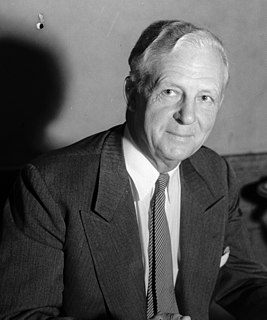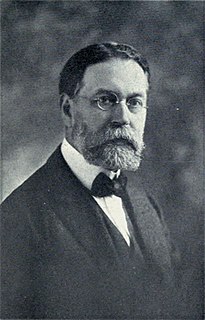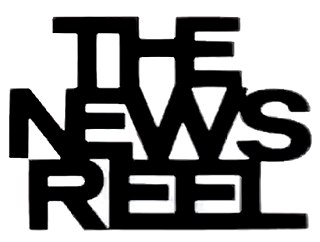Related Research Articles
A plutocracy or plutarchy is a society that is ruled or controlled by people of great wealth or income. The first known use of the term in English dates from 1631. Unlike most political systems, plutocracy is not rooted in any established political philosophy.

Thomas Woodrow Wilson was an American politician and academic who served as the 28th president of the United States from 1913 to 1921. A member of the Democratic Party, Wilson served as the president of Princeton University and as the governor of New Jersey before winning the 1912 presidential election. As president, Wilson changed the nation's economic policies and led the United States into World War I in 1917. He was the leading architect of the League of Nations, and his progressive stance on foreign policy came to be known as Wilsonianism.

Elihu Root was an American lawyer, Republican politician, and statesman who served as Secretary of State and Secretary of War in the early twentieth century. He also served as United States Senator from New York and received the 1912 Nobel Peace Prize. Root is sometimes considered the prototype of the 20th century political "wise man," advising presidents on a range of foreign and domestic issues.

The Progressive Era (1896–1916) was a period of widespread social activism and political reform across the United States of America that spanned the 1890s to World War I. To a lesser extent efficiency elements continued into the 1920s. The main objectives of the Progressive movement were addressing problems caused by industrialization, urbanization, immigration, and political corruption. Social reformers were primarily middle-class citizens who targeted political machines and their bosses. By taking down these corrupt representatives in office, a further means of direct democracy would be established. They also sought regulation of monopolies through methods such as trustbusting and corporations through antitrust laws, which were seen as a way to promote equal competition for the advantage of legitimate competitors. They also advocated for new government roles and regulations, and new agencies to carry out those roles, such as the FDA.

Culbert Levy Olson was an American lawyer and politician. A Democratic Party member, Olson was involved in Utah and California politics and was elected as the 29th governor of California from 1939 to 1943.
Frederick John "Fred" Dixon was a Manitoba politician, and was for several years the dominant figure in the province's mainstream labour and Henry George Single Tax Georgist movements. Also a proponent of proportional representation, he served as MLA in the Manitoba Legislature from 1914 to 1923.

Edward Hull "Boss" Crump Jr. was an American politician from Memphis, Tennessee. Representing the Democratic Party, he was the dominant force in the city's politics for most of the first half of the 20th century, during which the city had a commission form of government. He also usually dominated Tennessee politics from the 1920s to the 1940s. He was elected and served as mayor of Memphis from 1910 to 1915 and again briefly in 1940. However, he effectively appointed every mayor who was elected from 1915 to 1954.

Vito Anthony Marcantonio was an Italian-American lawyer and politician who served East Harlem for seven terms in the United States House of Representatives.

Edwin Robert Anderson Seligman (1861–1939), was an American economist who spent his entire academic career at Columbia University in New York City. Seligman is best remembered for his pioneering work involving taxation and public finance. His principles for a progressive federal income tax were adopted by Congress after the passage of the Sixteenth Amendment. A prolific scholar and teacher, his students had great influence on the fiscal architecture of postcolonial nations. He served as an influential founding member of the American Economics Association.
Modern liberalism in the United States, often simply referred to in the United States as liberalism, is a form of social liberalism found in American politics. It is the dominant tendency within liberalism in the United States. It combines ideas of civil liberty and equality with support for social justice and a "checked-and-validated" market economy. Economically, modern liberalism opposes cuts to the social safety net and supports a role for government in reducing inequality, providing education, ensuring access to healthcare, regulating economic activity and protecting the natural environment. This form of liberalism took shape in the 20th century United States as the voting franchise and other civil rights were extended to a larger class of citizens. Major examples of modern liberal policy programs include the New Deal, the Fair Deal, the New Frontier, and the Great Society.

The Fourth Party System is the term used in political science and history for the period in American political history from about 1896 to 1932 that was dominated by the Republican Party, except the 1912 split in which Democrats captured the White House and held it for eight years. American history texts usually call the period the Progressive Era. The concept was introduced under the name "System of 1896" by E. E. Schattschneider in 1960, and the numbering scheme was added by political scientists in the mid-1960s.

Lieutenant General Robert Lee Bullard was a senior officer of the United States Army. He was involved in conflicts in the American Western Frontier, the Philippines, and World War I, where he commanded the 1st Infantry Division during the Battle of Cantigny while serving on the Western Front. He later was an administrator in Cuba.

Woodrow Wilson's tenure as the 28th president of the United States, lasted from March 4, 1913, until March 4, 1921. Wilson, a Democrat who previously served as the governor of New Jersey, became president after winning the 1912 election, gaining a large majority in the electoral vote and a 42% plurality of the popular vote in a four-candidate field. Wilson was re-elected in 1916, defeating Republican candidate Charles Evans Hughes by a narrow margin. Despite his New Jersey base, most people thought of him as a Southerner, making him the first Southerner in the White House since Andrew Johnson in 1869, and just the second Democrat to be elected president since 1860.

The National Security League (NSL) was an American patriotic, nationalistic, nonprofit, nonpartisan organization that supported a greatly-expanded military based upon universal service, the naturalization and Americanization of immigrants, Americanism, meritocracy, and government regulation of the economy to enhance national preparedness.
Liberalism in the United States is a political and moral philosophy based on concepts of unalienable rights of the individual. The fundamental liberal ideals of freedom of speech, freedom of the press, freedom of religion, the separation of church and state, the right to due process and equality under the law are widely accepted as a common foundation of liberalism. It differs from liberalism worldwide because the United States has never had a resident hereditary aristocracy and avoided much of the class warfare that characterized Europe. According to Ian Adams, "all US parties are liberal and always have been. Essentially they espouse classical liberalism, that is a form of democratized Whig constitutionalism plus the free market. The point of difference comes with the influence of social liberalism and the proper role of government."
Centre-left politics lean to the left on the left–right political spectrum but are closer to the centre than other left-wing politics. Those on the centre-left believe in working within the established systems to improve social justice. The centre-left promotes a degree of social equality that it believes is achievable through promoting equal opportunity. The centre-left emphasizes that the achievement of equality requires personal responsibility in areas in control by the individual person through their abilities and talents as well as social responsibility in areas outside control by the person in their abilities or talents.

Alice Davis Marks Menken was a Jewish American known for her social work, particularly with female Jewish immigrant juvenile delinquency.
The German tariff of 1879 was a protectionist law passed by the Reichstag that imposed tariffs on industrial and agricultural imports into Imperial Germany.

The Newsreel, most frequently called Newsreel, was an American filmmaking collective founded in New York City in late 1967. In keeping with the radical student/youth, antiwar and Black power movements of the time, the group explicitly described its purpose as using "films and other propaganda in aiding the revolutionary movement." The organization quickly established other chapters in San Francisco, Boston, Washington, DC, Atlanta, Detroit, Chicago, Los Angeles, Washington, DC and Puerto Rico, and soon claimed "150 full time activists in its 9 regional offices." Co-founder Robert Kramer called for "films that unnerve, that shake people's assumptions…[that] explode like grenades in people’s faces, or open minds like a good can opener." Their film's production logo was a flashing graphic of The Newsreel moving in and out violently in cadence with the staccato sounds of a machine gun. A contemporary issue of Film Quarterly described it as "the cinematic equivalent of Leroi Jones's line 'I want poems that can shoot bullets.'" The films produced by Newsreel soon became regular viewing at leftwing political gatherings during the late 1960s and early 1970s, seen in parks, church basements, on the walls of buildings, in union halls, even at Woodstock." This history has been largely ignored by film and academic historians causing the academic Nathan Rosenberger to remark: "it is curious that Newsreel only occasionally shows up in historical studies of the decade."
References
- "Bygone Days." Memphis Commercial Appeal. February 21, 1997.
- "Died. Arthur Menken, 69, Newsreel Photographer." Time. October 22, 1973.
- Edwards, John Carver. Patriots In Pinstripe: Men of the National Security League. Washington D.C.: University Press of America, 1982. ISBN 0-8191-2350-1
- Pearlman, Michael. To Make Democracy Safe for America: Patricians and Preparedness in the Progressive Era. Urbana: University of Illinois Press, 1984. ISBN 0-252-01019-1
- "This is Arthur's!" Time. October 25, 1937.